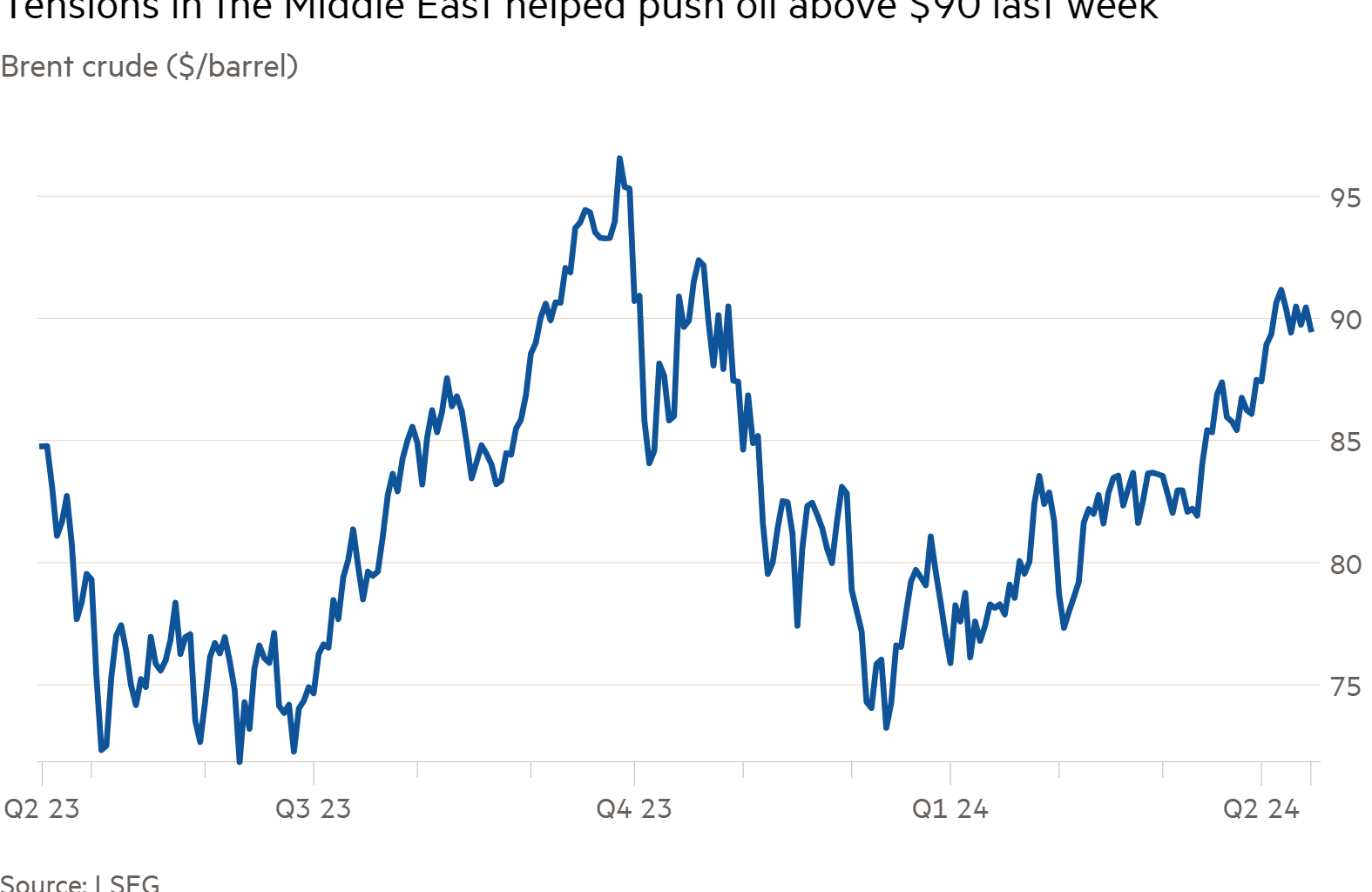Unlock the Editor’s Digest for free
Roula Khalaf, Editor of the FT, selects her favourite stories in this weekly newsletter.
Oil prices fell and equities advanced on Monday following Iran’s military strike on Israel as traders shrugged off fears the conflict could escalate into a full-blown war and curb supplies from the region.
Brent crude, the international benchmark, dropped 1.7 per cent to $88.91 per barrel on Monday morning. West Texas Intermediate, the US marker, fell 1.7 per cent to $84.24 per barrel.
The subdued reaction suggested markets were betting that the fallout from the strike would be contained after Iran said it considered the matter “concluded” and Washington sought to de-escalate tensions.
Traders had been anxiously watching to see how the market would react after the Islamic republic launched its first-ever strike on Israel from its own territory on Saturday. Tehran sent drones and missiles into the Jewish state in retaliation for a suspected Israeli attack on its consulate in Damascus that killed several military commanders.
Daniel Hynes, senior commodity strategist at ANZ Bank, said the fact that the attacks were well telegraphed had eased oil market concerns. “We had a build-up in the oil price before the weekend and so a geopolitical price premium was already built in prior to this event,” he said.
Equity markets advanced. Wall Street’s benchmark S&P 500 index rose 0.5 per cent, while the Nasdaq gained 0.3 per cent. In Europe, the region-wide Stoxx 600 index also gained 0.6 per cent, buoyed by strong performance for industrial and consumer groups. London’s FTSE 100 fell 0.1 per cent.
Yields on 10-year US Treasuries, which move inversely to prices, were up 0.15 percentage points at 4.65 per cent, following stronger than expected US retail sales. The price of gold, a haven asset, fell 0.4 per cent to $2,333.39 a troy ounce.

US President Joe Biden has urged Israel to take a measured approach in its response. Prime Minister Benjamin Netanyahu’s war cabinet met on Sunday but has not made a decision on how the country will react.
Experts warned that a severe response from Israel could ratchet up the conflict, restricting oil supplies from the region and pushing up prices.
“A significant Israeli retaliation could trigger a destabilising retaliatory cycle and move this conflict up the escalation ladder,” said Helima Croft, head of global commodity strategy at RBC Capital Markets and a former CIA analyst. “In such a scenario, we think the risk to oil is not insignificant.”
She added: “While Iran lacks the capability to close the Strait of Hormuz, they seemingly retain the capacity to replicate the 2019 playbook of attacking tankers, pipelines and critical energy infrastructure.”
Oil prices had climbed to their highest level since October in recent weeks following the attack on Damascus as markets weighed the potential for an escalation of the conflict that could affect Gulf supplies.
Bob McNally, president of consultancy Rapidan Energy and a former energy adviser to US president George W Bush, said the fallout from the Iranian strike could still propel prices “towards, if not beyond, $100 per barrel”.
“The market had been complacent about the Gaza conflict expanding to include Iran and, therefore, a material risk to Arabian Gulf oil and [liquefied natural gas] production and exports,” he said.
An exacerbation of the conflict risks shocking an already tight oil market globally as demand escalates in big economies such as the US and China while Opec+ producers constrain supply.
“The US and China stand to lose from the conflict’s expansion as it would significantly impact energy exports from the region, the price of oil, and the global economy,” said Ayham Kamel, practice head for the Middle East and north Africa region at consultancy Eurasia Group.
Any rise in prices would come at a particularly delicate moment for Biden, who has struggled to sell his economic record to voters ahead of November’s election amid stubbornly high inflation.
A further rise in crude prices threatens to exacerbate already elevated prices at the pump months before Americans head to the polls. Average US petrol prices sit at $3.63 a gallon, according to the AAA motoring group, up about 15 per cent since the start of the year.
“It’s hard to overstate how unwelcome a geopolitically driven oil price spike would be for both the economy and President Biden’s re-election,” said McNally.
Additional reporting by William Sandlund in Hong Kong
Read More: World News | Entertainment News | Celeb News
FT









